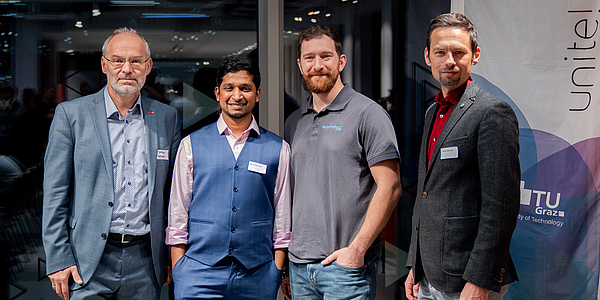Digital footprint: TU Graz opens House of Digitalisation
![[Translate to Englisch:] drei Männer und zwei Frauen im Business Outfit lachen in die Kamera](https://www.tugraz.at/fileadmin/_processed_/8/2/csm_Haus-der-Digitalisierung_Banner_by_AnnaPurkarthofer_85886c1b3e.jpg)
Digitalisation transforms the range of services and the core processes of universities in the fields of research, teaching and administration, but it also has a direct impact on the role they play in the context of social change. Successful and comprehensive digitalisation processes at universities are therefore key to safeguarding the competitiveness of Austria as a prime location for research and science. TU Graz was the first university in Austria to have adopted a digitalisation policy at the beginning of 2018. With its pilot project “Digital TU Graz” it is now creating a role model and suitable implementation processes that can then be applied by other Austrian universities.
An analogue house for Digital TU Graz
Since the beginning of this year, TU Graz has been launching concrete projects for the implementation of its digitalisation policy. The House of Digitalisation on Brockmanngasse 84, ceremonially opened on 26 June, is a tangible point of reference for the digitalisation offensive. Harald Kainz, Rector of TU Graz, and Claudia von der Linden, Vice Rector for Communication and Change Management, are both convinced that “Digital TU Graz” will become a success story and further strengthen Styria as a hotspot for innovation. “Our students stand to benefit from state-of-the-art digital teaching and learning methods, and at the same time administrative processes will become more efficient and service-oriented. In the field of research, digital transformation strengthens our efforts to provide an innovative and future-oriented working environment while also putting next-generation research data management at the disposal of our researchers. Finally, TU Graz will be able to better fulfil its social responsibility by implanting innovative responses to some of the most urgent global digital issues of our time in society.”
At the opening ceremony, Andrea Servida, Head of the European Commission’s “eGovernment and Trust” Unit, explained the European digitalisation policy and its impact on the tertiary education system. The fact that Elmar Pichl, the Head of Section from the Austrian Federal Ministry of Education, Science and Research, specifically travelled from Vienna to attend the opening ceremony is a further mark of appreciation of the role of TU Graz as a digital pioneer.
360 degrees digital
The House of Digitalisation will be the central hub for the multifarious developments and initiatives of TU Graz on the way to becoming a digital university in four areas of opportunity, namely teaching, research, administration and the third mission, i.e. the responsibility of the university towards society. Here, employees from various departments will be able to enjoy an interdisciplinary space of cooperation and an environment for the realisation of various transformation processes in which all stakeholders – from students to university staff – are involved.
The following activities characterize the four areas of opportunity:
The area of ‘Teaching’ addresses issues such as how to digitally support teaching by developing modern electronic examinations as a supplement of oral exams, and how to mesh classroom teaching with virtual teaching through digital technologies. As a result, teaching and learning content will be increasingly modular and freely accessible, but always with a firm focus on the continuous further development of the quality of teaching.
In the area of ‘Research’, data will be made readily accessible and reusable by building a standardised and efficient research data management system. This increases the effectiveness and international impact of research work. Digital technologies create a competitive working environment for researchers.
In the area of ‘Administration’, processes and information flows will be streamlined, thus increasing transparency and efficiency. The aim is to offer employees a flexible workplace with user-friendly, fully digitalised administration and working processes.
The ‘Third Mission’ will allow TU Graz to intensify the transfer of knowledge to society and further develop the University-as-a service-provider model. Technology-assisted training and education programmes will attract new target groups and increase the number of graduates in areas on which the success of the location depends. In line with its public education mission, TU Graz will roll out new programmes to engage the wider society and improve their education opportunities.
Kontakt
Manuela PÖTZLBERGER
Mag.
TU Graz | Vice Rectorate for Communication and Change Management
Transformation and Programme Management
Rechbauerstraße 12, 8010 Graz, Austria
Tel.: +43 316 873 6058
manuela.poetzlberger@tugraz.at




